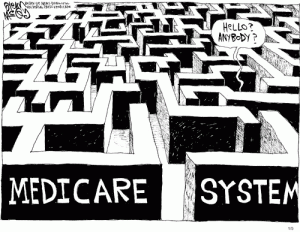Would you trust a robot to care for your residents?
By Steve Moran
I don’t know if this will become “the thing”, I kind of think not, but several entrepreneurs are working on robots as companions for older folks . . . a sort of substitute human companion. I get how they could be helpful for things like medication reminders and to answer questions, but I have a hard time believing they will really serve as substitute humans.
Worse, I worry that families and others will be lulled into giving seniors less attention knowing they have robots to stand in their stead.
More Realistic
A couple of weeks ago the White House issued The Annual Economic Report of the President in which the Administration speculates:
“There’s an 83% chance that automation will take a job with an hourly wage below $20, a 31% chance automation will take a job with an hourly wage between $20 and $40, and just a 4% chance automation will take a job with an hourly wage above $40.”
In other words, robots will take over low paying relatively manual tasks. This is both scary and great news.
Scary because it would seem to threaten the livelihood of those workers who are working at the lowest paid levels of society. Great news because it has the potential to let machines do at least some of the tasks that need to be done, but no one really likes doing. This could be a real solution to freeing up human capital to do things like caregiving, that machines can and should do.
Robots and Senior Living
Watch this amazing video . . . .
So where could robots work in Senior Living?
-
To run errands
-
To vacuum floors
-
To clean bathrooms
-
To do laundry
-
To make beds
-
To wash dishes
-
To prep some kinds of food
Or maybe . . . I know this is really a crazy idea, but maybe you could use a robot to shadow a resident with dementia keeping them monitored wherever they went.
None of this actually is available today and I would hate to see robots substituted for people simply to save costs. Yet if you could spend $50,000 on robots freeing up 5 or 10 fte’s it would mean you could pay better wages and have more people involved in actual interactions with residents. The things that are most important.
Maybe I am just dreaming, but I like the dream.








